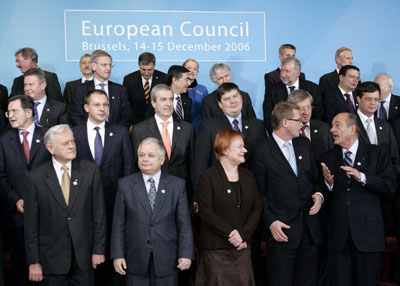EU leaders far from accord on future shape of union
(Reuters)Updated: 2006-12-15 16:26
BRUSSELS - European Union leaders seeking to reassure voters about plans to enlarge the bloc remained far from united on Friday about the future shape of the union, set to grow to 27 members when Bulgaria and Romania join on January 1.
|
|
A reference to dropping national vetoes on police and judicial cooperation as envisaged by the constitution was omitted from the draft final statement at the insistence of Britain, Poland and the Czech Republic.
That was a sign of the problems Germany will face in the EU chair from next month in a drive to revive efforts to reform the bloc's creaking institutions, which most members see as a precondition for any further enlargement.
Finnish Prime Minister Matti Vanhanen, the outgoing presidency holder, told reporters the leaders agreed on the need to reform the EU's governing treaty and could not simply tear up the constitution text and start again from scratch.
Meeting on Thursday, the EU leaders toughened their tone on future enlargement, insisting aspiring members fully adhere to entry criteria and tackle difficult justice reforms and the fight against corruption earlier in the accession process.
They endorsed a decision by foreign ministers this week to suspend a big chunk of Turkey's entry negotiations to sanction its failure to open its ports to traffic from Cyprus.
While they stopped short of setting new hurdles to future expansion and reaffirmed backing for the eventual EU membership of Turkey and the western Balkan states -- Albania, Bosnia, Croatia, Macedonia, Montenegro and Serbia -- the new mood amounted to a slowing of the enlargement process.
BACKLASH
Despite the summit affirmations, prospects for further enlargement are by no means certain given a public backlash in western Europe that followed the 2004 admission of 10 mostly ex-communist central and east European countries and disagreement over institutional reform.
French presidential candidate Nicolas Sarkozy hinted on Thursday he could block all negotiations with Turkey if elected next May, saying after a meeting of EU conservative leaders: "I'm happy to see that these ideas are gaining ground."
A German participant said Sarkozy had told them privately that if elected he would have an obligation to the French people
-- an apparent hint at a veto -- and urged them to start working on an alternative "privileged partnership" with Ankara.
Others at the meeting quoted Austrian Chancellor Wolfgang Schuessel as telling other conservative leaders he also believed Turkey would eventually get a status short of full membership.
Britain, a strong backer of Turkey which sees it as a strategic link to the Muslim world, insisted there should be no watering down of the EU's commitment to negotiate membership.
"I think that on balance people recognize that one can't just undo was has been done and been agreed because otherwise we would never make any progress on anything," British Foreign Secretary Margaret Beckett said.
Luxembourg Prime Minister Jean-Claude Juncker told reporters that while he backed candidacies of the Western Balkans states, further enlargement was not possible after the first of these -- Croatia -- eventually joined without EU institutional reform.
While some leaders argued there was an automatic link between enlargement and institutional change, "it is not Britain's point of view," she said.
Polish President Lech Kaczynski, meanwhile, argued that if the countries of the Western Balkans had membership prospects, "so should Ukraine, Georgia and Moldova."
|
||
|
||
|
|

